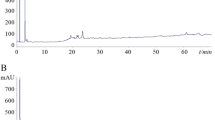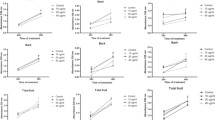Abstract
Purpose
Ecballium elaterium (L.) A. Rich (Cucurbitaceae), also known as the “squirting cucumber,” is a wild medicinal plant found abundantly in Moghan, Ardabil province, Iran. This study was undertaken to examine possible cytotoxic effect of freeze-dried aqueous extract of E. elaterium fruit on cell lines of gastric and esophageal origin namely called AGS (human gastric carcinoma) and KYSE30 (human esophageal squamous cell carcinoma).
Methods
The aqueous extract of the fruits of E. elaterium was prepared and freeze-dried. AGS and KYSE30 cancer cell lines were treated by the extract and incubated for 24, 48, and 72 h. Cytotoxicity was examined by MTT assay. Ethidium bromide/acridine orange (EB/AO) staining was used for apoptotic cell detection. A DAPI staining method was used to analyze cell cycle by flow cytometry.
Results
The IC50 values were 2.5, 0.7, and 0.7 μg/ml for AGS cell line after 24, 48, and 72 h, respectively. IC50 values for KYSE30 cell line were 500, 150, and 125 μg/ml after 24, 48, and 72 h, respectively. The EB/AO staining showed an increase in apoptotic cells. Cell cycle analysis showed a significant increase in cell density at G2/M phase.
Conclusions
The results of the current study showed that the freeze-dried aqueous extract of E. elaterium fruit has a cytotoxic effect on gastric and esophageal cancer cell lines by means of apoptosis. The gastric cancer cells (AGS) showed a remarkably higher sensitivity. It seems that several compounds are possibly responsible for the cytotoxic effect of the extract.



Similar content being viewed by others
References
Attard E, Attard H. Antitrypsin activity of extracts from Ecballium elaterium seeds. Fitoterapia. 2008;79(3):226–8.
Greige-Gerges H, et al. Cucurbitacins from Ecballium elaterium juice increase the binding of bilirubin and ibuprofen to albumin in human plasma. Chem Biol Interact. 2007;169(1):53–62.
Ljubuncic P, et al. Antioxidant activity and cytotoxicity of eight plants used in traditional Arab medicine in Israel. J Ethnopharmacol. 2005;99(1):43–7.
Qiao L, Wong BC. Targeting apoptosis as an approach for gastrointestinal cancer therapy. Drug Resist Updat. 2009;12(3):55–64.
Saidi F, et al. Endoscopic esophageal cancer survey in the western part of the Caspian Littoral. Dis Esophagus. 2002;15(3):214–8.
Ribble D, et al. A simple technique for quantifying apoptosis in 96-well plates. BMC Biotechnol. 2005;5:12.
Attard EG, Scicluna-Spiteri A. Ecballium elaterium: an in vitro source of cucurbitacins. Fitoterapia. 2001;72(1):46–53.
Momma K, et al. Direct interaction of cucurbitacin E isolated from Alsomitra macrocarpa to actin filament. Cytotechnology. 2008;56(1):33–9.
Shan XL, et al. Inhibitory effect of cucurbitacin E on the proliferation of ovarian cancer cells and its mechanism. Chin J Cancer. 2010;29(1):20–4.
Li Y, et al. The induction of G2/M cell-cycle arrest and apoptosis by cucurbitacin E is associated with increased phosphorylation of eIF2alpha in leukemia cells. Anticancer Drugs. 2010;21(4):389–400.
Jayaprakasam B, Seeram NP, Nair MG. Anticancer and antiinflammatory activities of cucurbitacins from Cucurbita andreana. Cancer Lett. 2003;189(1):11–6.
Nakahata AM, et al. The effects of a plant proteinase inhibitor from Enterolobium contortisiliquum on human tumor cell lines. Biol Chem. 2011;392(4):327–36.
Acknowledgments
This study was supported by a financial grant from research deputy for Ardabil University of Medical Sciences.
Author information
Authors and Affiliations
Corresponding author
Rights and permissions
About this article
Cite this article
Bohlooli, S., Jafari, N. & Jahed, S. Cytotoxic Effect of Freeze-Dried Extract of Ecballium elaterium Fruit on Gastric Adenocarcinoma (AGS) and Esophageal Squamous Cell Carcinoma (KYSE30) Cell Lines. J Gastrointest Canc 43, 579–583 (2012). https://doi.org/10.1007/s12029-012-9383-4
Published:
Issue Date:
DOI: https://doi.org/10.1007/s12029-012-9383-4




